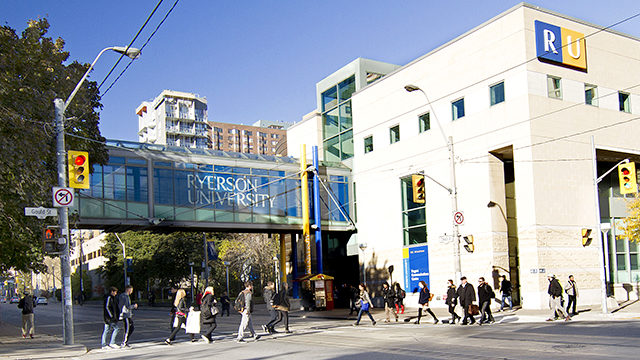
Ryerson was ranked in the bottom bracket of the annual QS World University Rankings, behind 24 other Canadian schools. (Ryersonian file photo)
Ryerson is back at the bottom of the annual QS World University Rankings, released Tuesday.
The British company slotted the school into the “701+” category for the second straight year – an afterthought in a list headed by the Massachusetts Institute of Technology, University of Cambridge and Imperial College London.
Related stories:
- Surprise: Ryerson cracks top 10 in Maclean’s university rankings
- Low QS ranking doesn’t rankle Ryerson’s president
Meanwhile, 24 Canadian schools fared better. The University of Toronto and McGill University took the 20th and 21st spots, respectively, and the Universities of British Columbia, Montreal and Alberta finished in the top 100.

For the full listings visit www.topuniversities.com.
But when Ryerson appeared in the list for the first time last year, it came as a surprise to Ryerson president Sheldon Levy. His administration didn’t apply to be listed at all.
“We looked at some of their numbers and they were totally wrong,” said Levy on Monday of last year’s rankings.
The purpose of Quacquarelli Symonds annual report, according to the U.K.-based organization’s website, is “to help students make informed comparisons between their international study options.” It makes evaluations based on “four broad areas of interest to prospective students: research, teaching, employability and international outlook.”
Levy claimed that the methodology used by QS is based on an outdated view of education and doesn’t consider Ryerson’s more innovative approach.
“In a way, it is a biased rankings,” said Levy. “We decided we weren’t going to submit simply because they wouldn’t take any of the data that we thought was relevant.”
He pointed to the 2014 rankings from Sweden’s University Business Incubator Index, which listed Ryerson’s Digital Media Zone as fifth in the world.
A representative for QS defended the reputation of its model, arguing that “all rankings methodologies are imperfect and have limitations.”
“Millions of students and parents around the world, who are our key stakeholders, use our rankings,” said QS public relations head Simona Bizzozero in an email. “And their endorsement is what ultimately matters the most to us.”
Bizzozero added that QS includes universities that don’t submit packages because “the rankings would not accurately reflect the positions of universities according to our methodology” if they didn’t.
Last year, Ryerson scored higher in certain categories of the QS listings. It made the 151-200 brackets in subjects of Communication & Media Studies and Geography.
This year, it didn’t make the top 200 in any subject.
Ryerson was also shut out entirely by QS’s companions in what many consider the “big three” of organizations devoted to international university comparisons. The school was absent from the Academic Rankings of World Universities 2014 listing of 500 schools and from the Times Higher Education World University Rankings 2013-14 list of 400.
Levy ultimately admitted that choosing not to submit data to QS this year “was a mistake” on the part of his administration – especially knowing that the organization would list the university anyway.
This story was first published in The Ryersonian, a weekly newspaper produced by the Ryerson School of Journalism, on Sept. 17, 2014.
Sam completed his Masters of Journalism at Ryerson University in 2015. His experience includes work with the Toronto Star, Postmedia Network, CBC Radio and Toronto Life magazine. He's also former editor-in-chief of The Silhouette, McMaster University's campus newspaper.

